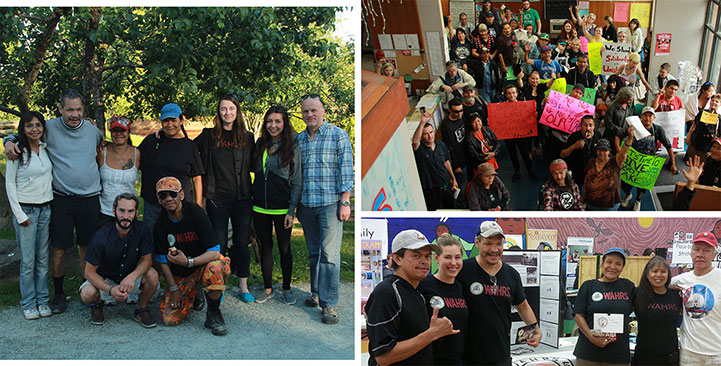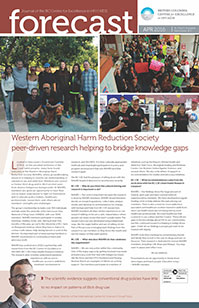
Located in Vancouver’s Downtown Eastside (DTES), on the unceded territories of the Coast Salish peoples, many have found welcome at the Western Aboriginal Harm Reduction Society (WAHRS), where groundbreaking research is helping to rewrite our understanding of substance use and addiction. Members are current or former illicit drug and/or illicit alcohol users from diverse Indigenous backgrounds. At WAHRS, members are given an opportunity to have their voices heard, empowered to fight for themselves and to educate policy makers, healthcare professionals, researchers, and others about members’ strengths and challenges.
The group’s membership includes over 300 individuals and falls under the umbrella of the Vancouver Area Network of Drug Users (VANDU), with over 3000 members. WAHRS members participate in weekly meetings, healing circles, and, during at least four months of the year, go out to the University of B.C. farm on Musqueam territory where they have a chance to connect with nature, help during harvest or work in the kitchen. An important part of empowering members is WAHRS’ involvement in community protests and advocacy work.
WAHRS has worked since 2011 in partnership with researchers from the BC Centre for Excellence in HIV/AIDS (BC-CfE) Urban Health Research Initiative. The research aims to better understand members’ experiences with access to healthcare, access to addictions treatment, involvement in research, and HIV/AIDS. It is their culturally appropriate methods and meaningful participation in policy and program development that sets WAHRS and their research apart.
The BC-CfE had the pleasure of sitting down with the WAHRS board of directors for an interview recently.
BC-CfE – Why do you think this cultural sharing and research is important to do?
WAHRS – Our work is important because the research is done by WAHRS members. WAHRS Board Members decide on research questions, collect data, analyze results, and develop recommendations for change, with background help from BC-CfE researchers. WAHRS members all share similar experiences so our research talking circles are a safe, relaxed place where people can share stories that aren’t usually heard. The research process was developed using indigenized ways, like the eagle feather and use of talking circles. Part of this process is bringing back findings from the research to our members so they know the results and see the impact of their participation.
BC-CfE – What else does WAHRS do that celebrates the organization?
WAHRS – We are very active within the community. One of the many ways is by getting involved in protests and advocacy work that deal with Indigenous issues. Idle No More and the DTES Murdered and Missing Women March are examples of efforts we actively support. Our members participate in a number of initiatives such as the Mayor’s Mental Health and Addiction Task Force, Aboriginal Healing and Wellness Centre, Sex Workers United Against Violence, and several others. We also write letters of support or recommendation for studies and advocacy initiatives.
BC-CfE – What recommendations came from the work done with the BC-CfE Urban Health Research Initiative?
WAHRS – Our findings show the huge amount of trauma, grief, pain and basic survival instincts experienced by members. We have developed a regular healing circle to help address this pain among our members. There is also a need for more addictions specialists and healthcare workers trained in addictions since our health needs are not being met by most healthcare professionals. We need healthcare that connects to our culture and the Creator. There still are gaps in the knowledge about HIV in our communities, but this continued research is helping to bridge those gaps. Under all our findings is people just want to be treated with dignity.
WAHRS ends their meetings by remembering friends and family they’ve lost to the war on drugs and war on the poor. Their research is dedicated to forever WAHRS members, including Cliff, Brian and Melwyn. You may want to pause and reflect now.
All our relations.
“Presentations are an opportunity to break down stereotypes and teach people. Education is key.” – WAHRS member.

